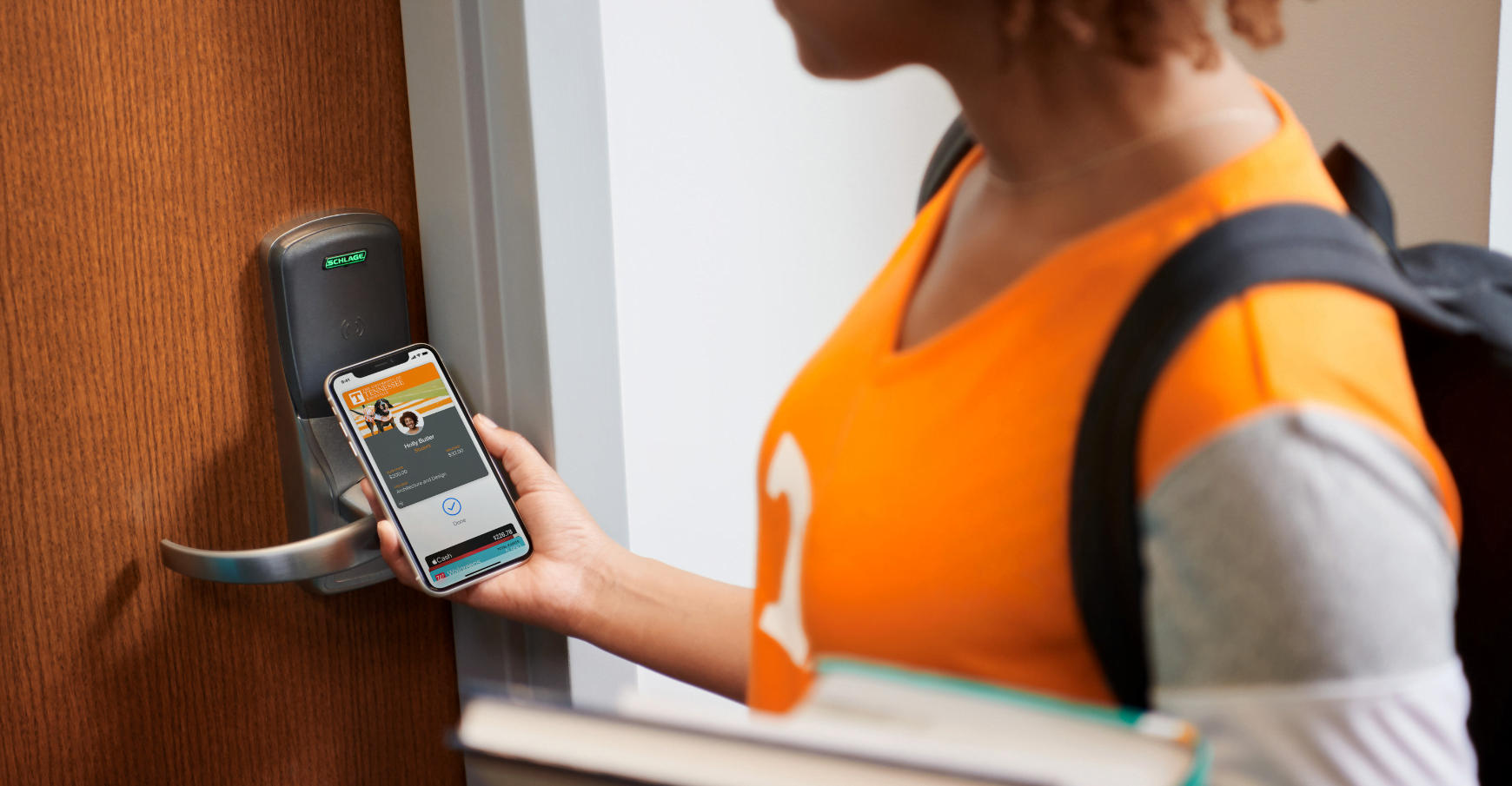
Access control goes mobile across hundreds of Tennessee buildings
 By Jeff Koziol, business development manager of campus software partners, Allegion
By Jeff Koziol, business development manager of campus software partners, Allegion
Nearly 29,000 students arrive at University of Tennessee, Knoxville, each August for the start of fall semester. With VolCards in hand, these students set out across 294 buildings on Tennessee's 910-acre campus. In October 2019, that experience changed.
The university introduced mobile credentials last fall to keep up with growing student demands for a digital VolCard experience on campus.
The benefits of a mobile student ID are always significant, and the need for them now is even more apparent. As campuses plan to reopen after being shut down since the spring, they need to welcome students back to healthy environments.
This comes at a time when people are more aware of the surfaces they’re touching. Mobile credentials can be issued digitally. Furthermore, remote distribution reduces the number of students that need to pick up replacement cards in person. And since mobile credentials are contactless, transactions and secure access can occur without an individual needing to swipe or hand over a physical card.
When University of Tennessee, Knoxville, decided to transition to mobile credentials a few years ago, its focus was on improving the student experience and operational benefits. Bill Strickland, director of operational services at University of Tennessee, Knoxville, started receiving requests for campus cards on a mobile device from the university's Student Government Association.
Mobile credentials make it easier and more convenient for students and faculty to access buildings like residence halls or the library, as well as to make payments on and around campus. From coffee to laundry and other purchases, students just need an iPhone or Apple Watch to go about their daily routines.
The university also knew it would benefit from being able to cut down on its plastic card production, printing and other operational efficiencies.
“As an institution that values innovation, it’s important to us that we are always adapting to the way students use technology to enhance the campus experience,” said Chris Cimino, Senior Vice Chancellor Finance and Administration at the University of Tennessee, Knoxville. “Being able to access the VolCard on your mobile device is another way UT is continuously improving to meet expectations for a modern campus.”
The mobile student ID leverages the industry-leading global standard NXP DESFire security technology to provide higher education campuses with an easy-to-implement solution to enable contactless student IDs for iPhone and Apple Watch.
“As an institution that values innovation, it’s important that we're always adapting to the way students use technology to enhance the campus experience. Accessing the VolCard on your mobile device is another way UT is continuously improving to meet expectations for a modern campus.”
-- Chris Cimino, Senior Vice Chancellor Finance and Administration, University of Tennessee, Knoxville
The user experience with NFC on Apple devices enables a seamless and secure user experience. The user presents their iPhone or Apple Watch near the reader without the need to unlock the device or open an application. With the mobile student ID, users now have the convenience of using their phones for everyday transactions. Schlage AD electronic locks, NDE and LE networked wireless locks and MT multi-technology readers support contactless student IDs in Apple Wallet using CBORD’s CS Gold software.
The University of Tennessee, Knoxville was the first campus to implement the mobile solution from CBORD and Allegion in Apple Wallet.
One of the first steps for Strickland and Mike Henderson, VolCard technology supervisor, was defining use case across campus. To move forward, it’s important for colleges and universities to understand every single way a student uses a card on campus. Entering the dining hall, accessing the fitness center, opening residence hall doors—all of it needs documented for the rest of the process to go smoothly.
“Essentially, we had to find every reader on campus where a student could use their VolCard and figure out a way that a mobile credential would work there,” said Henderson. “That was challenging because there were places that we didn’t even know about at first. There were some external systems, like at the recreation center, that were a little more challenging than others, but we got everything squared away with the support of our teams from other departments.”
The next task was replacing hardware.
“When migrating to a newer technology, like mobile credentials, there’s work to do on the front end, like with any campus security update,” said Mark Werner, end user sales consultant at Allegion. “The team at the University of Tennessee, Knoxville, did a tremendous job of coordinating with their teams and updating thousands of readers.”
Roughly 5,000 readers throughout campus needed to be upgraded or replaced to support the new mobile credential solution with Allegion. Henderson’s team replaced a majority of the readers while students were away over summer break.
They converted competitive card readers to the Schlage MT wired multi-technology readers and updated the reader modules in their AD-400 networked wireless locks. Designed for flexibility, Schlage multi-technology readers allow campuses to easily transition from proximity or magnetic stripe technology to more secure, encrypted credentials, like mobile credentials in the Apple wallet or smart cards. The university also upgraded its physical campus card technology to Schlage smart credentials using NXP MIFARE DESFire EV1. Students still needed to use a physical card until the mobile credential solution was available.
Once the readers were installed, CBORD updated Tennessee’s one-card software to CS Gold, a customizable solution supporting campus auxiliary services. CS Gold helps colleges and universities build a connected campus through integrated systems including security and access control, attendance and activity tracking, meal plan and stored value management, on- and off-campus commerce, and more.
Implementation will look different for every college or university depending on the hardware and technology in place and the compatibility and interoperability of solutions. Strickland said they hit some hurdles from time to time but ultimately paved the way for more seamless adoption. “We were the first CBORD school to have the digital ID, and I think it will be much easier for other schools to get there.”
“Students that I’ve encountered absolutely love it,” Henderson said. “The ones who have the mobile credential don’t even carry their cards anymore. I haven’t swiped my card for building access since October 2019, and I use my Apple Watch 99% of the time; I don’t even need to get my phone out.”
In approximately six months after the mobile credentials launched, 10,000 unique devices were provisioned for the mobile credentials. Those devices completed more than 2 million transactions. On average, the university was seeing between 15,000-20,000 transactions per day with the mobile credential—sometimes as high as 30,000. This data was collected before the campus shut down last spring. It expects these numbers will increase as students are welcomed back in August.
“It’s very convenient to be able to present your phone to a reader for access and transactions,” said Larry Delaney, vice president of strategic alliances at CBORD.
“Those who have the mobile credential don’t even carry their cards anymore. I haven’t swiped my card for building access since October 2019, and I use my Apple Watch 99% of the time; I don’t even need to get my phone out.”
--Mike Henderson, VolCard technology supervisor
“Apple improved the user experience by adding a feature that pops up, even if a phone is locked, to show the student his or her balances in different campus accounts," said Delaney. "It sounds trivial, but the way students had to get that in the past was to talk to the dining hall attendant or open a separate mobile application. They automated a previously manual task, which adds value for the students.”
Aside from the student experience, the mobile student ID is going to benefit the university as students are welcomed back this fall. Due to COVID-19, summer orientations couldn’t take place in person, which is when students would have picked up their physical VolCards.
The university expects many students will take advantages of mobile credentials during the start of the Fall 2020 semester. This will reduce the number of students gathering in the card office to pick up their IDs at the start of the year as everything can be handled digitally. The university is looking forward to adding the Android solution in the near future to enhance student use with both iOS and Android smartphones.
There is some peace of mind knowing that most students will be able to come back to a campus that is contactless in terms of transactions. They don’t have to touch a keypad or pass their card to someone else. It’s easy and more hygienic.
Furthermore, mobile credentials have cut down on the number of plastic cards the office must reprint for students each. It saw a drop last year, and the university expects to see extraordinary reduction moving forward as students go mobile during future orientations.
"There's some peace of mind knowing that most students will be able to come back to a campus that is contactless in terms of transactions. They don’t have to touch a keypad or pass their card to someone else. It’s easy and more hygienic."
The mobile credential solution has also improved security on campus. “Phones are personal; people want to keep them in their possession. As a result, people aren’t giving away their phones like they might an ID card," Henderson adds. "This has lowered fraud and given us better insights into who is actually using the credential for access.”
Since launching mobile student IDs in October 2019, VolCard holders enjoy even more seamless transactions and access as they go about their daily routines. By implementing a mobile credential solution, University of Tennessee, Knoxville, met the demands of its tech-savvy students while improving operational efficiencies. Furthermore, the university is now better prepared for students to return to campus in the fall following recent COVID-19 guidelines.
If you’re interested in learning more about mobile credential options, visit allegionmobilecampus.com or contact Allegion.




